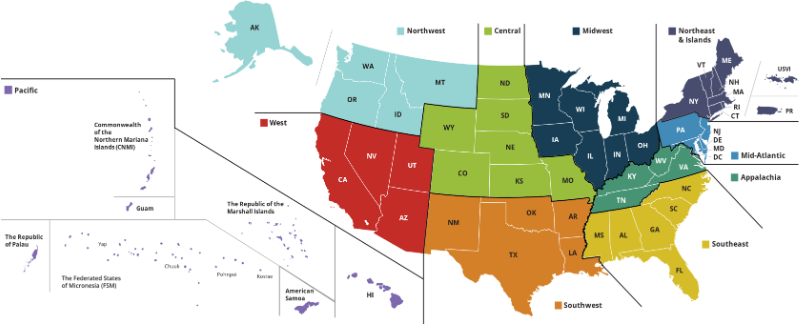The advocacy team is happy to debut the first in a series of blogs with the Institute of Educational Sciences. Our department relies on and draws upon the data and resources provided by NCES and IES, and we have invited IES/NCES to present at various AASA events in recent years. This blog series stems from conversations from a member meeting in 2024, and is designed to highlight the myriad ways NCES/IES and their resources support the nations schools. This first blog post is about Regional Education Labs (RELs), which provide free services and resources that can help superintendents base district-level decisions on policies, programs, and practices in research on what’s worked in districts like yours and get more bang for your buck. USED supports ten RELs, which collectively serve the 50 states, Washington D.C., and most U.S. Territories. Each REL is located in the region they serve and is staffed with a deep bench of locally based content and research experts.
In a post-ESSER environment, it is more important than ever that districts maximize every dollar they spend by investing in what works. USED’s
Regional Educational Lab (REL) Program provides free services and resources that can help you base district-level decisions on policies, programs, and practices in research on what’s worked in
districts like yours and get more bang for your buck. USED supports ten RELs, which collectively serve the 50 states, Washington D.C., and most U.S. Territories. Each REL is located in the region they serve and is staffed with a deep bench of locally based content and research experts.
The RELs partner with districts and state education associations in their region to support the use of evidence to improve student outcomes. They do this by helping partners explore and use their own data and by offering partners evidence-informed technical assistance. And the best part? Not only are REL services and resources free of charge, but RELs are required by law to address the evidence-related needs identified by state and local partners. In other words, the RELs take a bottom-up, rather than a top-down approach to developing the supports they provide.
What does this look like in practice? Let’s say your district is considering adopting or changing a program to incorporate evidence-based literacy practices across the curriculum. Your REL can offer individual consultation services for you and other decisionmakers about the latest high-quality research on literacy instruction and then lead educators through the process of implementing evidence-based practices. Would you like to find out if a current policy or practice in your district – for example, a program to support retention of early career teachers – is working as intended? The RELs can provide quick-turnaround technical support to help your staff conduct research on their own, or the RELs can partner with your team to conduct the research on your behalf, all free of charge.
The REL Program website houses
hundreds of free to use tools and resources that RELs have developed as part of the technical assistance and research supports they’ve provided states and districts. You can search by topic or type of resource, or even by the state where the work was done. See something you know a colleague could use? Please share it—and help us scale what’s being learned locally nationwide.
If you would like to learn more about how your REL can support your district or have specific questions around evidence that the RELs can help answer, please reach out to your local REL, or contact me directly at chris.boccanfuso@ed.gov.
| REL | Director | Contact Email |
|---|
| REL Appalachia | Victoria Schaefer | victoria.schaefer@sri.com |
| REL Central | Steve Lipscomb | SLipscomb@mathematica-mpr.com |
| REL Mid-Atlantic | Brian Gill | BGill@mathematica-mpr.com |
| REL Midwest | Kyle Fagan | kfagan@air.org |
| REL NEI | Julie Riordan | JRiordan@edc.org |
| REL Northwest | Katie Drummond | kdrummo@wested.org |
| REL Pacific | Christina Tydeman | ctydeman@mcrel.org |
| REL Southeast | Nicole Patton Terry | npattonterry@fsu.edu |
| REL Southwest | Amy Feygin | afeygin@air.org |
| REL West | John Rice | jrice@wested.org |




